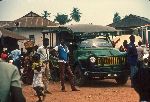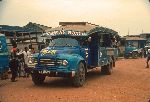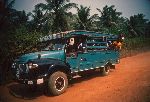|
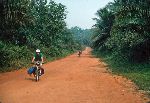
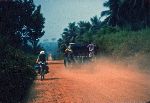
In parts of the Western Region of Ghana there are still dirt roads that take you some place. This isn't all bad. The traffic volume is low and
the dirt doesn't build up heat
as much as an asphalt road, and generally the forest isn't cut back as far from
the road so there tends to be more shade or at least a little cool air spilling
out of the forest. But when a truck comes by you can really get really dusted!
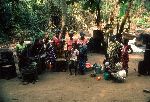 In
our travel we came across a family working a coconut oil factory. The
identifiable steps in the processing the coconut were: collecting the nuts, chopping off the husk, drying the nut
until the liquid inside solidified, cracking the nut and taking out the meat,
drying the meat some more, and boiling the meat to separate out the oil.
The husks were used for fuel in for the fire so there didn't seem to be any
deforestation involved and the whole process seemed sustainable. In
our travel we came across a family working a coconut oil factory. The
identifiable steps in the processing the coconut were: collecting the nuts, chopping off the husk, drying the nut
until the liquid inside solidified, cracking the nut and taking out the meat,
drying the meat some more, and boiling the meat to separate out the oil.
The husks were used for fuel in for the fire so there didn't seem to be any
deforestation involved and the whole process seemed sustainable.
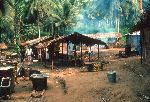
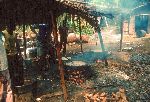
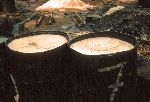
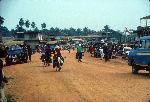 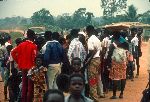 Arriving
in town, we weren't real sure where we were. Detailed maps of Ghana were hard
to come by in the west. But it was easy to draw a crowd, which helped us
to conclude that we were in Half Assini. Arriving
in town, we weren't real sure where we were. Detailed maps of Ghana were hard
to come by in the west. But it was easy to draw a crowd, which helped us
to conclude that we were in Half Assini.
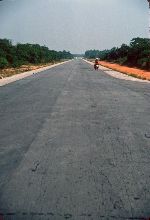 Forget
all that earlier praise for dirt roads. At least at first blush reaching the
paved road was a blissful experience. Forget
all that earlier praise for dirt roads. At least at first blush reaching the
paved road was a blissful experience.
You don't realize how much rolling resistance there is on a dirt road until you
compare it to the floating experience of just arriving on asphalt. The
thought of no more dust was also liberating. The
honeymoon doesn't last too long in the tropics. Hardly before the sun
reaches late morning you start to realize that heat is taking aim at you from
all directions -- radiant heat raise from below to envelope the road and solar
heat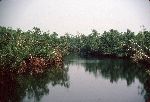 bears down on you from above. With the coastal
humidity sweat doesn't evaporate efficiently to lift the heat off of your body.
It can seem like a reflector oven and you are stewing in your own juices. bears down on you from above. With the coastal
humidity sweat doesn't evaporate efficiently to lift the heat off of your body.
It can seem like a reflector oven and you are stewing in your own juices.
The humidity is probably hangs in the air in part because there are lot of slow moving
rivers crossing the coastal plain. The combination of a sparse population and the need to
build a lot of bridges probably limits the impetus to construct more highly
engineered roads in
this part of the country.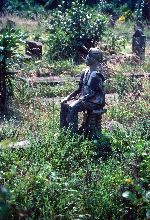
 An
eye catching cultural characteristic of Western Ghana is the grave markers.
There are place in the world with bigger and bolder mausoleums but some of
Ghana's grave stone seemed to
be particularly distinguished and dignified. An
eye catching cultural characteristic of Western Ghana is the grave markers.
There are place in the world with bigger and bolder mausoleums but some of
Ghana's grave stone seemed to
be particularly distinguished and dignified.
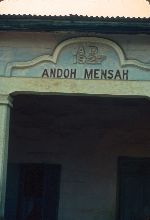 In
Axim the streets are paved -- or were once -- some of the building hint at past
grandeur and the power poles have lines strung between them. In a way this
reflects the history of Ghana. In the early 1960, just after independence,
the country had more paved roads and electrification than it did by the end of
the 1970s. At the time of In
Axim the streets are paved -- or were once -- some of the building hint at past
grandeur and the power poles have lines strung between them. In a way this
reflects the history of Ghana. In the early 1960, just after independence,
the country had more paved roads and electrification than it did by the end of
the 1970s. At the time of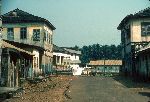 independence, 1957, it was considered second world country, far better off than
South Korea at the same time. By the end of the century it had started to
turn itself around, but it had lost decades to South Korea.
independence, 1957, it was considered second world country, far better off than
South Korea at the same time. By the end of the century it had started to
turn itself around, but it had lost decades to South Korea.
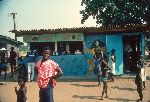
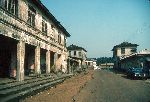
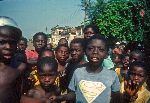
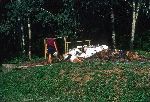 The are other
countries in West Africa were rubber is a much more major product. We
passed a couple of large inactive looking rubber plantations. The photo at the right shows a pile
of older (brown) and new (white) coagulated latex blocks. Generally the
trees didn't look like they were being very regularly tapped, so it wasn't clear
what was going on. The are other
countries in West Africa were rubber is a much more major product. We
passed a couple of large inactive looking rubber plantations. The photo at the right shows a pile
of older (brown) and new (white) coagulated latex blocks. Generally the
trees didn't look like they were being very regularly tapped, so it wasn't clear
what was going on.
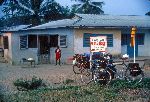 Continuing
the theme of relative scarcity, roadside
restaurants are few and far between in the Western Region. So, when we were real hungry
and got a great meal at Mame Ahu's Restaurant, near Agora, we were really
relived, and they get a spot on the Internet (which hadn't been invented when
this photo was taken.) Continuing
the theme of relative scarcity, roadside
restaurants are few and far between in the Western Region. So, when we were real hungry
and got a great meal at Mame Ahu's Restaurant, near Agora, we were really
relived, and they get a spot on the Internet (which hadn't been invented when
this photo was taken.)
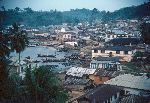 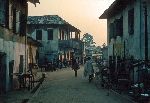 Turn
south at Agona Junction and go to the end of the road and you will get to the
fishing village at the end of the road --Dixcove. It is a very picturesque
location. The town has the look and feel of a place with a steady economy, but
not thriving economy. Turn
south at Agona Junction and go to the end of the road and you will get to the
fishing village at the end of the road --Dixcove. It is a very picturesque
location. The town has the look and feel of a place with a steady economy, but
not thriving economy.
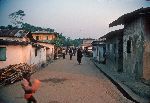
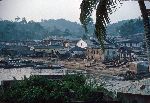
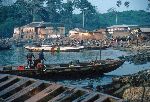


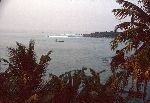 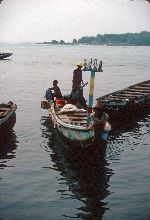 The
fishermen often go out at night and
return in the morning. Their source of light is hurricane lamps attached to
a mast (right). The
fishermen often go out at night and
return in the morning. Their source of light is hurricane lamps attached to
a mast (right).
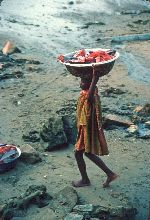 When
the fishermen return, Dixcove beach can be a hubbub of activity even before the
sun rises above the adjacent hill. The fishermen lay their catch out on the beach
and sell it to fish mongers who take them to the city markets, like Takoradi, to be
sold again. When
the fishermen return, Dixcove beach can be a hubbub of activity even before the
sun rises above the adjacent hill. The fishermen lay their catch out on the beach
and sell it to fish mongers who take them to the city markets, like Takoradi, to be
sold again.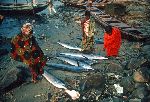
[Note: Catches have been decreasing dramatically in recent years so a seller-buy
opportunity with a half-dozen marlin fish on the beach are rare these days.]


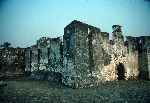 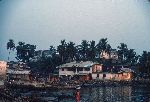 Fort
Metal Cross sits on a hill above the town and predates Dixcove. It is said to have gotten its name because all the slaves that were
transported through this fort had a cross mark on their body. This were done by
putting a metal cross into a fire and then branding the person with a cross mark
for the purpose of identification. Fort
Metal Cross sits on a hill above the town and predates Dixcove. It is said to have gotten its name because all the slaves that were
transported through this fort had a cross mark on their body. This were done by
putting a metal cross into a fire and then branding the person with a cross mark
for the purpose of identification.
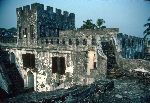 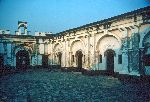 The short history of the fort is the chief of Upper/Greater Dixcove leased the English
the promontory near
Inhuman village. The hill is located next to a large and sheltered bay, later
designated as Dick's Cove (Dixcove). The Cove's calm waters and sandy beach made
it an ideal landing for canoes and small boats while ships could anchor offshore. The Royal African The short history of the fort is the chief of Upper/Greater Dixcove leased the English
the promontory near
Inhuman village. The hill is located next to a large and sheltered bay, later
designated as Dick's Cove (Dixcove). The Cove's calm waters and sandy beach made
it an ideal landing for canoes and small boats while ships could anchor offshore. The Royal African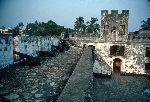 Company
began construction of the
fort in 1692 but was unable to complete it until 1698 because of spasmodic
attacks by the Ahanta people, which continued well into the 18th century. By
1750, the fort was equipped to carry up to 25 canons. Company
began construction of the
fort in 1692 but was unable to complete it until 1698 because of spasmodic
attacks by the Ahanta people, which continued well into the 18th century. By
1750, the fort was equipped to carry up to 25 canons.
Various source have the purpose of the fort as a player in the gold and slave
trade, and as a repair station for ship, given the easy access to wood in the
forest. The fort doesn't have a large holding area for slaves, which might have
constrained it role in this enterprise.
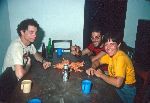
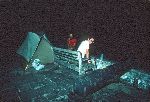 In
the 1980's the fort was used as a guest house. The Spartan living quarters
made it as or more pleasant to sleep on the ramparts than in the rooms. In
the 1980's the fort was used as a guest house. The Spartan living quarters
made it as or more pleasant to sleep on the ramparts than in the rooms.
Getting a lobster dinner from the local fishermen cost just a few dollars.
It was a tasty reward for effort to visit.
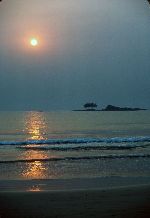 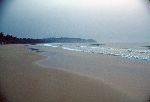 Around
the point from Dixcove is Busua
Beach. It is perhaps the most beautiful beach in Ghana. It is very flat, the sand is
fine and it stretches for miles. It seems to have a stream of beauty
throughout the day: In the morning the beach is beautiful as the mist hangs above
the surf. In the afternoon it is beautiful as the washed sand shines in
the sun. And, in the evening it is beautiful as the sky, waves and beach
are painted with a spectrum of color. Until the crowds come and interrupt
the meditation it converges with nirvana. Around
the point from Dixcove is Busua
Beach. It is perhaps the most beautiful beach in Ghana. It is very flat, the sand is
fine and it stretches for miles. It seems to have a stream of beauty
throughout the day: In the morning the beach is beautiful as the mist hangs above
the surf. In the afternoon it is beautiful as the washed sand shines in
the sun. And, in the evening it is beautiful as the sky, waves and beach
are painted with a spectrum of color. Until the crowds come and interrupt
the meditation it converges with nirvana.
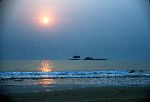
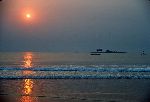
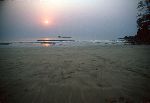
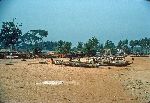 It
should be noted that at the west end of the beach is a fishing village and
several large resorts are planned along the pristine length of beach. It
should be noted that at the west end of the beach is a fishing village and
several large resorts are planned along the pristine length of beach.
[Note: since the time that these photographs of Busua Beach were taken, several
new resort properties have been developed.]
 It would seem that
the road to between Agona Junctions and Takoradi wasn't filled with photographic
subjects. The only thing that caught my attention was a sculpture at the
entrance of someone dream for a new suburban residential area. It would seem that
the road to between Agona Junctions and Takoradi wasn't filled with photographic
subjects. The only thing that caught my attention was a sculpture at the
entrance of someone dream for a new suburban residential area.
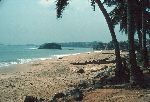 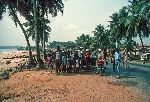 East
of Takoradi and and west of Sekondi the coast road (not the Pan-Africa Highway) hugs
the coast. The view are delightful and it is nice to linger a bit so that
it doesn't end to quickly. East
of Takoradi and and west of Sekondi the coast road (not the Pan-Africa Highway) hugs
the coast. The view are delightful and it is nice to linger a bit so that
it doesn't end to quickly.
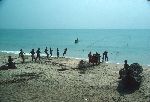 It is possible and
engaging to watch the crews pull the fishing nets in from the shore. This is
sort of like watching the weather channel -- the process can take hours, and
minute to minute nothing seems to change. It is possible and
engaging to watch the crews pull the fishing nets in from the shore. This is
sort of like watching the weather channel -- the process can take hours, and
minute to minute nothing seems to change.
For all of the people involved and for all of the time and effort that goes into
the setting and hauling in the nets, the quantity of the catch is not very
impressive.

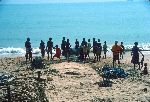

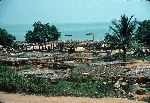 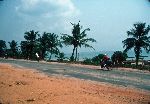 Most
of the fish catch from the shore is small fish and most of these small fish are sundried.
For miles along this section of coast you pass drying rack in and surrounding
the villages. Once the fish are dried they are packed and shipped throughout
the country, including the far north, for resale. Most
of the fish catch from the shore is small fish and most of these small fish are sundried.
For miles along this section of coast you pass drying rack in and surrounding
the villages. Once the fish are dried they are packed and shipped throughout
the country, including the far north, for resale.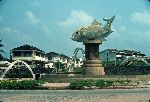
Though it is a much smaller town, I have more pictures of
Sekondi than I do of Takoradi -- by exactly one. Fittingly enough the
picture is of a large fish sculpture.
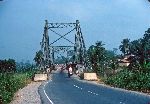 Bridges
ahead means the Pra River. It may be the only body of water in the Western
Region that is big enough to require a bridge with a superstructure to span it.
The Pra River is near the boundary between the Western Region and Central Region
of Ghana. Bridges
ahead means the Pra River. It may be the only body of water in the Western
Region that is big enough to require a bridge with a superstructure to span it.
The Pra River is near the boundary between the Western Region and Central Region
of Ghana. |
























































